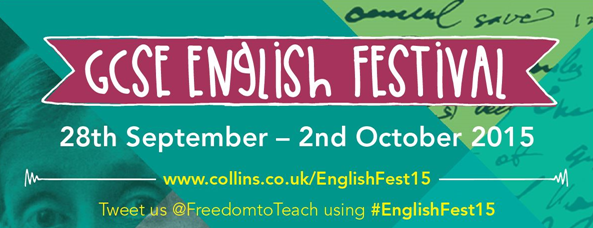The re-introduction of the 19th century novel onto the GCSE English Literature syllabus is one of the greatest challenges for teachers today. This isn’t because we haven’t taught it before, or because we don’t believe that students will benefit from reading novels from the Literary canon. It is because, all students, of all abilities will now be tested on their knowledge of these novels in exam conditions. They will not only need to have read, understood and analysed these texts, but remember them well enough to refer to them, unaided, in the exam. As I see it, there are five key challenges facing teachers. Here are my ideas on how to overcome them.
Find out more about Collins GCSE English Festival here.
1. Reading the novel. Some of these novels are short (Dr Jekyll and Mr Hyde, A Christmas Carol) but many of them are hefty tomes (Great Expectations, Jane Eyre), and with the best will in the world it will be impossible to read these in their entirety in the classroom. So, what can we do about it?
- Set the reading as a Summer Reading project between year 9 and 10. Enlist parental support by emailing all parents, posting it on your school website, twitter feed etc. Obviously, not all students will complete it, so give the lower sets the opportunity to start reading it in class at the end of year 9, then set the ‘re-reading’ of the novel as homework during Autumn term. Check their progress by setting quick quizzes on the reading each week.
- Start an after-school/ lunchtime Reading Club for students who are struggling to read, so that they can read with a teacher, and have their comprehension questions answered. This will free up your lesson time for analysing the text.
- Challenge able students with a homework project on a second 19th century novel. We chose A Christmas Carol, as it is short, and fairly accessible. This will allow them to consolidate the skills they are learning in class, deepen their understanding of the social/historical context and provide them with a choice in the exam.
2. Getting to grips with the vocabulary. Most students have some familiarity with the stories of Frankenstein, Dr Jekyll and Mr Hyde, and A Christmas Carol. However, even the most confident 15 year old reader can be taken aback by the Victorian penchant for complex lexis. It is all very well providing glossaries for students, but in my experience they rarely use them. Instead, try the following:
- Ask students to create their own glossaries. Then make them write a new sentence with the word, rather than just cutting and pasting their definitions from Google!
- Allow students’ to use their mobile phones. I am always amazed at how a simple ‘look up the definitions’ exercise becomes more engaging for students, as soon as they are allowed to use their mobile phones. I had all 30 of year 10s fully engaged in this exercise last week, especially as I made it a competition.
- Ask students to explain the new words to a partner, without using their notes. This will test out their understanding of the definitions.
3. Understanding the social, cultural and historical context. Don’t count on your students having ever watched a period drama set in 19th century England. The majority of my students get confused between Elizabethan and Victorian England, so don’t assume they know anything about the weird and wonderful social etiquettes and expectations of 19th century society. I have also learned that it is meaningless to set ‘research’ on the context for homework. This usually results in a copy and pasted set of notes form Wikipedia, which the student hasn’t read and doesn’t understand. Alternatively, have a go at the following:
- Use images to bring the period to life. Photographs from the era, in all their awkward glory, are great for demonstrating the stultifying etiquettes of middle class life. There are also a rich plethora of Victorian cartoons and moral adverts, which will provide your students with a window into the age.
- Research in the classroom. Select the sources yourself, but make your students put it into their own words. This cuts out the issue of students looking up the wrong information, and it forces them to show their absorption of the key points.
- Show excerpts from film and television. As English teachers, I should imagine most of us are armed with a truckload of period drama footage to drop into a lesson to demonstrate Victorian schools (Hard Times), the differences between rich and poor (North and South), morality of the period (Tess of the D’Urbervilles) etc. Horrible Histories are also a brilliant resource for starters on context. Their sketches on ‘Victorian manners’ and ‘Polite Victorian House’ are a hilarious way to introduce students to the many strictures placed upon the middle and upper classes.
To be continued…..stay tuned for Part 2 of Engaging All Students in 19th Century Literature. Written by Naomi Hursthouse





